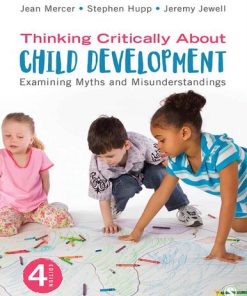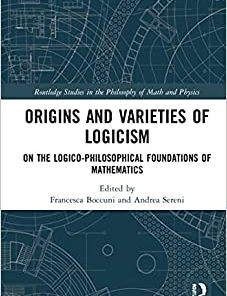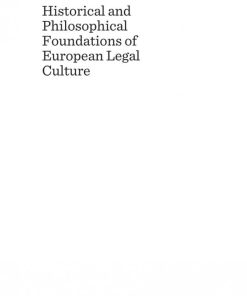Thinking about Statistics: the Philosophical Foundations 1st Edition by Jun Otsuka ISBN 1032333103 9781032333106
$50.00 Original price was: $50.00.$25.00Current price is: $25.00.
Thinking about Statistics: the Philosophical Foundations 1st Edition by Jun Otsuka – Ebook PDF Instant Download/Delivery: 1032333103, 9781032333106
Full download Thinking about Statistics: the Philosophical Foundations 1st Edition after payment

Product details:
ISBN 10: 1032333103
ISBN 13: 9781032333106
Author: Jun Otsuka
Simply stated, this book bridges the gap between statistics and philosophy. It does this by delineating the conceptual cores of various statistical methodologies (Bayesian/frequentist statistics, model selection, machine learning, causal inference, etc.) and drawing out their philosophical implications. Portraying statistical inference as an epistemic endeavor to justify hypotheses about a probabilistic model of a given empirical problem, the book explains the role of ontological, semantic, and epistemological assumptions that make such inductive inference possible. From this perspective, various statistical methodologies are characterized by their epistemological nature: Bayesian statistics by internalist epistemology, classical statistics by externalist epistemology, model selection by pragmatist epistemology, and deep learning by virtue epistemology. Another highlight of the book is its analysis of the ontological assumptions that underpin statistical reasoning, such as the uniformity of nature, natural kinds, real patterns, possible worlds, causal structures, etc. Moreover, recent developments in deep learning indicate that machines are carving out their own “ontology” (representations) from data, and better understanding this—a key objective of the book—is crucial for improving these machines’ performance and intelligibility. Key Features Without assuming any prior knowledge of statistics, discusses philosophical aspects of traditional as well as cutting-edge statistical methodologies. Draws parallels between various methods of statistics and philosophical epistemology, revealing previously ignored connections between the two disciplines. Written for students, researchers, and professionals in a wide range of fields, including philosophy, biology, medicine, statistics and other social sciences, and business. Originally published in Japanese with widespread success, has been translated into English by the author.
Thinking about Statistics: the Philosophical Foundations 1st Table of contents:
1 The Paradigm of Modern Statistics
1.1 Descriptive Statistics
1.1.1 Sample Statistics
1.1.2 Descriptive Statistics as “Economy of Thought”
1.1.3 Empiricism, Positivism, and the Problem of Induction
1.2 Inferential Statistics
1.2.1 Probability Models
1.2.2 Random Variables and Probability Distributions
1.2.3 Statistical Models
1.2.4 The Worldview of Inferential Statistics and “Probabilistic Kinds”
Further Reading
2 Bayesian Statistics
2.1 The Semantics of Bayesian Statistics
2.2 Bayesian Inference
2.2.1 Confirmation and Disconfirmation of Hypotheses
2.2.2 Infinite Hypotheses
2.2.3 Predictions
2.3 Philosophy of Bayesian Statistics
2.3.1 Bayesian Statistics as Inductive Logic
2.3.2 Bayesian Statistics as Internalist Epistemology
2.3.3 Problems with Internalist Epistemology
2.3.4 Summary: Epistemological Implications of Bayesian Statistics
Further Reading
3 Classical Statistics
3.1 Frequentist Semantics
3.2 Theories of Testing
3.2.1 Falsification of Stochastic Hypotheses
3.2.2 The Logic of Statistical Testing
3.2.3 Constructing a Test
3.2.4 Sample Size
3.3 Philosophy of Classical Statistics
3.3.1 Testing as Inductive Behavior
3.3.2 Classical Statistics as Externalist Epistemology
3.3.3 Epistemic Problems of Frequentism
3.3.4 Summary: Beyond the Bayesian vs. Frequentist War
Further Reading
4 Model Selection and Machine Learning
4.1 The Maximum Likelihood Method and Model Fitting
4.2 Model Selection
4.2.1 Regression Models and the Motivation for Model Selection
4.2.2 A Model’s Likelihood and Overfitting
4.2.3 Akaike Information Criterion
4.2.4 Philosophical Implications of AIC
4.3 Deep Learning
4.3.1 The Structure of Deep Neural Networks
4.3.2 Training Neural Networks
4.4 Philosophical Implications of Deep Learning
4.4.1 Statistics as Pragmatist Epistemology
4.4.2 The Epistemic Virtue of Machines
4.4.3 Philosophical Implications of Deep Learning
Further Reading
5 Causal Inference
5.1 The Regularity Theory and Regression Analysis
5.2 The Counterfactual Approach
5.2.1 The Semantics of the Counterfactual Theory
5.2.2 The Epistemology of Counterfactual Causation
5.3 Structural Causal Models
5.3.1 Causal Graphs
5.3.2 Interventions and Back-Door Criteria
5.3.3 Causal Discovery
5.4 Philosophical Implications of Statistical Causal Inference
Further Reading
6 The Ontology, Semantics, and Epistemology of Statistics
6.1 The Ontology of Statistics
6.2 The Semantics of Statistics
6.3 The Epistemology of Statistics
6.4 In Lieu of a Conclusion
People also search for Thinking about Statistics: the Philosophical Foundations 1st:
thinking about statistics: the philosophical foundations
what philosophers think about beauty
why is philosophical thinking important
what is the foundation of philosophy
thinking about philosophy
Tags: Jun Otsuka, Statistics, Philosophical
You may also like…
Psychology - Developmental Psychology
Thinking Critically About Child Development 4th Edition Jean Mercer
Mathematics - Logic
Politics & Philosophy - Women's Studies
Politics & Philosophy - General & Miscellaneous Philosophy
For The Common Good: Philosophical Foundations Of Research Ethics 1st Edition Alex John London
Uncategorized
Politics & Philosophy - Social Sciences
Philosophy of Social Science: The Philosophical Foundations of Social Thought 3rd Edition Ted Benton
Arts - History & Criticism
Thinking About Art 1st Edition by Penny Huntsman ISBN 1118904974 9781118904978
Uncategorized
Historical and Philosophical Foundations of European Legal Culture 1st Edition Dawid Bunikowski
Uncategorized











